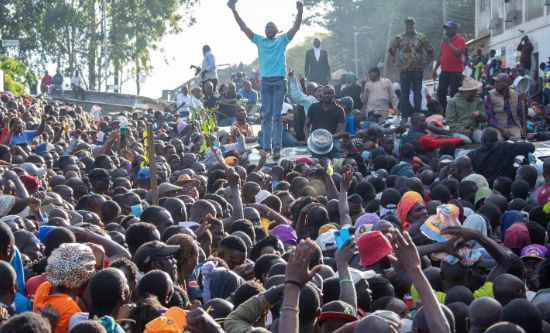
At the end of July, mass protests resumed in Kenya over the rising cost-of-living, inflation and a new tax law brought in by the government at the behest of the IMF on 1 July. The Kenyan security forces have responded with their customary brutality – by 23 July at least 30 people had been killed and hundreds injured. Despite a ban on protests introduced by the government of President Ruto, thousands of people in Kenya’s major cities have fought back in the face of the live ammunition and teargas used by the security forces. The protests, which began in March, were initially called by the Azimio la Umoja One Kenya Coalition, an alliance of Kenyan opposition parties led by the failed presidential candidate and pro-imperialist billionaire Raila Odinga. In true opportunist fashion, having unleashed a resistance from the Kenyan working class he cannot control, he called off a mass protest scheduled for 26 July to ‘pray for the victims’ of the violence instead.
Behind the savage repression of the Kenyan state stand the imperialist institutions of the IMF and World Bank, which have demanded Kenya impose austerity, privatise public services and state utilities and increase taxes in return for meagre, stop-gap financial support.
Kenyan economic crisis
The Kenyan currency, the shilling, has been devalued against the dollar and there are high levels of inflation (9%), extreme poverty (18%), and unemployment (12.3%). Kenya’s dollar-denominated debt has ballooned from $16bn in 2013 to $68bn in 2023. Of this 28% is owed to the World Bank, 20% to Eurobond holders and 17% to China. So vast is Kenya’s debt that no matter how much it pays off, the deeper into debt it sinks. Debt repayments consumed 30% of the country’s revenue in 2021: now the figure is 50%. Kenya spent $7.23bn on debt repayments during the 11-month period to May 2023, and its budget deficit is 6% of GDP; it has hovered between 5-8% of GDP since 2012. In June 2024, a $2bn Eurobond falls due for repayment.
The World Bank and IMF have made clear they do not believe Kenya can meet its debt obligations. The ratings agency Fitch revised Kenya’s credit status to negative, citing a poor macroeconomic environment and uncertainties over the government’s debt repayment capacity as a result of weakening revenue position.
Kenya signed a 38-month agreement with the IMF in May 2023 for a pitiful $1.16bn loan that comes with the usual stringent conditions. The IMF has demanded ‘fiscal consolidation and a tighter monetary policy’. This translates as Kenya increasing interest rates, eradicating a fuel subsidy to the poor, doubling VAT on petroleum products to 16%, and introducing a new housing tax of 1.5% for every employee. The World Bank and IMF first demanded the doubling of VAT in 2021. The IMF has demanded rationalisation of public services – ie job losses – and the merging, ‘restructuring’ and reforming of state-owned corporations Kenya Airways and Kenya Power, to make them ‘profitable’ by jettisoning ‘support staff’. The Kenyan government has duly obliged by implementing the Finance Act 2023 which is meant to raise $1.5bn. This is clearly the first of many attacks on the working class. These pitiful sums raised will not get Kenya out of this hole. Waiting in the wings to pick off the carcass will be the British with the UK-Kenya Economic Partnership Agreement, which came into force in March 2021; the European Union, which signed its Economic Partnership Agreement with Kenya in 2023 and the United States, which is currently negotiating a Trade and Investment Framework Agreement with Kenya. These agreements are designed to open the country’s agricultural markets to imperialist control by removing barriers and tariffs. Kenya’s exports are dominated by tea and flowers which use its most arable land, while millions starve due to the high prices of imported food.
Kenya: imperialist ally
Kenya, a former British colony, also plays a wider role for imperialism in east Africa. Kenya has supported the US and British in carving up Somalia by invading, then occupying, Jubaland, a semi-autonomous region in southern Somalia. It used the kidnappings of foreign nationals as a pretext to launch a pre-planned operation in 2011, to create a buffer state that gives it greater access to the oil-rich Indian Ocean.
US Embassy cables in 2008 sent by ambassador Michael Ranneberger were published by Wikileaks two years later. They revealed that Kenya had been involved in arming Southern Sudan since at least 2007, receiving arms shipments and transporting them to the city of Juba via Uganda, to fuel the civil war for the secession of South Sudan from Sudan. The Kenyan Prime Minister at the time of the arms shipments was none other than Raila Odinga. The 2011 secession has turned out to be a disaster for the people of South Sudan, which collapsed into civil war barely two years into ‘independence’ leaving 400,000 dead and the economy moribund. Kenya is currently mediating an end to the April 2023 civil war that broke out in Sudan between the Sudan Armed Forces (SAF) and the Rapid Support Forces (RSF), on behalf of the imperialists; it has already been accused by the SAF of supporting the RSF and its business interests. Only the Kenyan masses can free Kenya from the clutches of imperialism.
Charles Chinweizu




